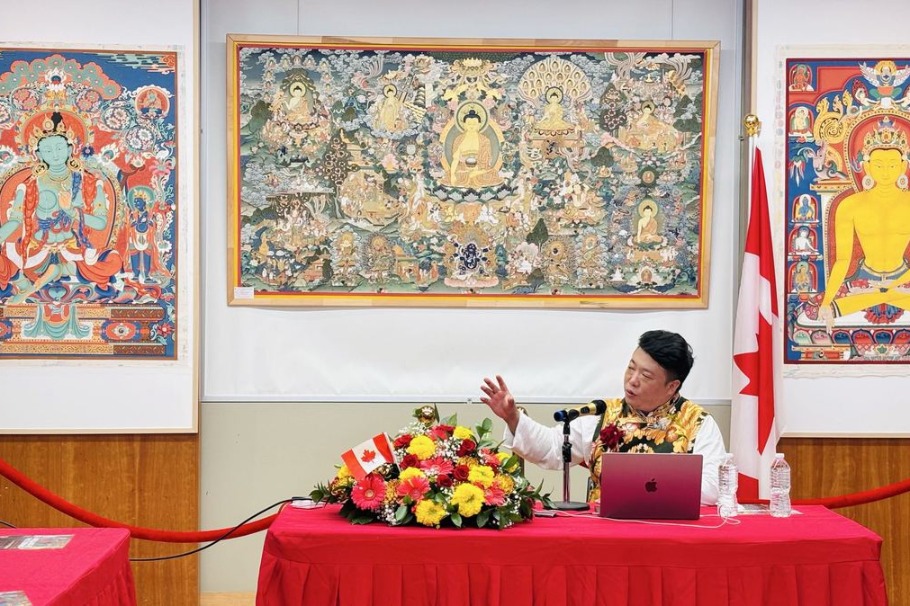‘Cultural appropriation’: first a prom dress was a no-no, now it’s a bikini

Another episode in the silly "cultural appropriation" debate emerged in social media and New York headlines recently.
A black fashion student was accused of "fetishizing" Asian women after designing a chinoiserie bikini. Chinoiserie refers to Chinese motifs and techniques used in Western designs.
On Jan 5, Palais Du Dèsir, a New York-based brand, posted a video online promoting its chinoiserie reversible swimsuit to be sold on Chinese New Year, Feb 5.
The brand is owned by Vanessa Danelle, a student at the Fashion Institute of Technology in New York.
Some social media users alleged cultural appropriation and asked to have the design taken down.
Twitter user @taejkang said the swimsuit "promotes the over-sexualization and fetishization of Asian women".
The designer ceded no ground in response to another commenter on Instagram.
"By you asking me to remove MY work from MY page shows how disrespectful YOU are. You have some nerve. No it won't be taken down. I'm not here to please you or any of the internet trolls who dislike my work," Danelle wrote. "Check yourself before you check me.
"It's just fabric, and if black people [can't] use Asian fabrics [let me know] where that law is written," Danelle wrote. "Stop looking for a reason to be offended."
It calls to mind the story of a white Utah teenager who wore a qipao to her prom last year.
Keziah Daum, then 18 and a high school senior in Utah, posted four prom pictures on Twitter on April 22 that featured her in a traditional Chinese qipao, or cheongsam.
Daum faced a backlash from thousands online.
"This is my culture, not your ... prom dress," one Twitter user wrote.
But Daum found some welcome support from netizens in China.
"The dress is so gorgeous, and the girl looks great in it," wrote user Xiaoxiongnaicha on Weibo. "As a Chinese, we all very proud and delighted to share our cultural fashions with anyone around the world. We all support her."
"It is not cultural appropriation, it's cultural appreciation," wrote Weibo user Wuyiya. "Can anyone living in the US let the girl know that many Chinese people think she looks stunning in this beautiful dress?"
"I have been overwhelmed by the many people from China who have both reached out to me and have posted to social media their viewpoints. I thank them for the moral support regarding my decision to wear a qipao," Daum told China Daily at the time. "I sincerely thank the outpouring of support I have received from the people of China."
Daum's exquisite dress was red and orange with gold-and-black embroidery.
"The gown caught my eye at first because of its beauty," she said.
Cheers to both Ms Danelle and Ms Daum for pushing back against the social media scolds.
In fact, too often we see corporations, politicians, celebrities and theretofore obscure people quickly caving to "social media firestorms".
Sure, there are some outrageous instances for which an apology and penance are necessary from "the offender".
But in the two cases above, it's simply a matter of free expression.
If people want to tweet and say they don't like it, they can do that, too.
But if their intent is only to terrorize the person who "culturally appropriated", to make them shut their social media accounts and to cost them their livelihoods, then that crosses into a "virtual" assault.
If rock 'n' roll originated in the US, did The Beatles and The Rolling Stones in England culturally appropriate it?
What about learning a foreign language? Is that appropriation? Tell that to the millions around the world studying Mandarin.
How about the US Postal Service's popular Chinese New Year stamps, which always sell out?
Whatever happened to the expression "Imitation is the sincerest form of flattery."?
Contact the writer at williamhennelly@chinadailyusa.com

































